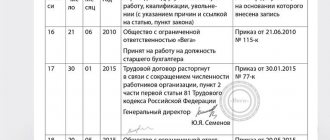Late payment upon dismissal: what is it?
Late payment in labor relations is understood as delay in payments of amounts due to employees (salaries, vacation pay, etc.). When dismissing a worker, payments must be made by one or both parties:
- employer in accordance with Art. 140 of the Labor Code of the Russian Federation pays the employee the unpaid part of the salary, compensation for unused vacation days, etc. To the manager dismissed by decision of the owner of the organization’s property, when the termination of the employment contract is not related to the actions of the head of the organization, under Art. 279 of the Labor Code of the Russian Federation, special compensation is paid;
- the employee compensates for real damage caused to the employer, but the amount of such compensation is limited to the average monthly earnings of the dismissed person (Article 241 of the Labor Code of the Russian Federation). If the employee is a financially responsible person, then for him the limitation on the amount of compensation is removed, and he compensates for all direct actual damage. The list of positions for which it is possible to conclude an agreement on full financial liability was approved by Resolution of the Ministry of Labor of the Russian Federation dated December 31, 2002 No. 85.
According to Art. 140 of the Labor Code of the Russian Federation, the calculation is made on the last day of work, coinciding with the day of dismissal, and if there is a discrepancy, no later than the next day after the employee requests the calculation.
ConsultantPlus has many ready-made solutions, including how to make final payments to an employee upon dismissal. If you don't have access to the system yet, you can sign up for a free trial online! You can also get the current K+ price list.
The main type of late payments made by the employer is delayed wages. After a salary delay of 15 days or more, the employee, as specified in Part 2 of Art. 142 of the Labor Code of the Russian Federation, has the right to suspend work at any day. However, when settlement, including payment of the remaining salary, is necessary due to the dismissal of an employee, the suspension does not make sense. The Labor Code, the Code of Administrative Offenses and the Russian Federation provide for other ways to encourage the employer to make timely payments, namely material, administrative and criminal liability for delayed payments.
Where to go if your employer delays payment
If on the last working day the salary was not issued or a demand for payment was submitted, but no action was taken by the company management to repay the debt, then you should complain to the supervisory authorities.
An employee whose rights regarding the payment of compensation upon dismissal have been violated, if the opportunity to apply to the following types of authorities:
- Labor Inspectorate;
- Prosecutor's Office;
- Court.
If a case of violation and delay of wages is identified, you should immediately defend your rights. Contacting all of these authorities is free and you do not need to pay any fees.
Labour Inspectorate
If the employer does not want to solve the problem peacefully, the citizen can write an appeal to the labor inspectorate.
Its main goal is to ensure control over the implementation of the provisions of the Labor Code of the Russian Federation.
The authority has the following rights:
- monitor the employer’s compliance with the provisions of the Labor Code of the Russian Federation;
- explain to employees their rights;
- receive citizens and consider their complaints;
- consider cases of administrative incidents if the employer allowed this to happen.
An employee can contact the labor inspectorate in person. Trade unions and labor collectives have similar rights.
The government agency may order the employer to eliminate existing violations.
How to write a complaint to the labor inspectorate
A complaint to the labor inspectorate can be sent in paper form or through the electronic service available on the website onlineinspektsiya.rf. Let's talk about the second method in more detail:
- Click on the “Report a problem” service.
- Select the category of the problem (in our case it will be “Wages”).
- Click on “Salary Delay”.
- We indicate what result we expect from filing an application: conducting an inspection, consulting a state inspector, initiating administrative proceedings with holding persons accountable.
- We log in to the “State Services” portal (the system will automatically transfer to this portal).
- Again, select the desired result of the request.
- We draw up the actual application. We fill out all the fields and send the application to the labor inspectorate.
A response from the government agency will come within 30 days.
Court
If the violations have not been eliminated, the employee may file a lawsuit. To begin the process, you must submit an application to the district government agency.
Justices of the peace do not deal with such issues. The application is submitted at the employer's location.
It is allowed to file a claim in court in case of non-payment of money within a month from the date of violation of labor rights.
The regulations are clearly stated in Article 392 of the Labor Code of the Russian Federation.
If the prosecutor's office or the Labor Inspectorate revealed violations and issued a decision on the payment of wages by the employer, and he, in turn, does not comply with the instructions, then the initiators of the claim will be government agencies.
In other situations, the statement is similar to a complaint, but in accordance with Article 131 of the Code of Civil Procedure of the Russian Federation, it is written by the injured citizen independently.
He will also have to personally prove violations and defend his rights.
In this case, it is difficult to win the case without an experienced lawyer, but it is possible. The above-mentioned certificates are used as evidence.
Prosecutor's office
Appeal to the prosecutor's office is also permitted. In order for the government body to begin considering the case, you need to draw up an application.
It must make a reference to Article 140 of the Labor Code of the Russian Federation and set out the requirements for the employer.
How to file a complaint with the prosecutor's office
If the labor inspectorate was unable to help the victim, then the injured party has the right to contact the Prosecutor's Office with a request to initiate an inspection in connection with non-payment of funds upon dismissal.
The main thing here is to correctly formulate the tasks, so it is recommended to refer to Article 140 of the Labor Code of the Russian Federation.
The text of the appeal describes in detail the situation that arose with the employee after dismissal.
Certificates obtained in accordance with current legislation are used as evidence:
- a copy of the dismissal order;
- a copy of the work book;
- salary certificate;
- a copy of the employment agreement;
- statement of income tax transfer.
Depending on the detected offenses, the manager faces criminal or administrative punishment.
Unfortunately, prosecutorial checks rarely yield positive results, so it is necessary to complain in parallel to all possible supervisory authorities.
Proof
The fact of violation of rights will have to be proven. To confirm that he is right, the employee can use certificates obtained in accordance with current legislation.
The employee should have with him:
- copies of orders;
- a copy of the employment contract;
- a certificate confirming the amount of income;
- document confirming the transfer of insurance premiums;
- a copy of the work book.
The court will agree to accept other information confirming that wages were not paid.
The presence of such documentation will become the basis for a decision in favor of the employee.
Financial liability of the employer for delay in payment
In accordance with Art. 236 of the Labor Code of the Russian Federation, the employer’s financial liability lies in the obligation imposed on him by the court to compensate the resigning person for the following amounts:
- Debt on mandatory payments, including, by virtue of Art. 236 of the Labor Code of the Russian Federation, include:
- salary;
payments upon dismissal (severance pay, compensation upon dismissal due to reduction, etc.);
- vacation pay (including compensation for unused vacation), etc.
- Cash compensation (interest on late payments).
According to paragraph 55 of the Supreme Court Resolution No. 2, the claim for the recovery of the amount of payments and compensation is satisfied by the court, regardless of whether the employer is at fault for the delay.
Interesting: as stated in paragraph 55 of the Resolution of the Plenum of the Supreme Court of the Russian Federation dated March 17, 2004 No. 2 (hereinafter referred to as the Supreme Court Resolution No. 2), the employee has the right to indexation of salary amounts, since during the delay it gradually depreciates due to inflation.
In practice, this looks, for example, like this: in the case when the Central Bank revokes the license of a bank serving an employer under Part 9 of Art. 20 of the Law “On Banks and Banking Activities” dated December 2, 1990 No. 395-1-FZ, the bank no longer has the right to transfer money based on customer payment orders. If the employer did not react on time and did not ensure that employees received their salaries in another way, then a delay will occur. Formally, the employer is not to blame for the delay in payments, but nevertheless he bears financial responsibility to his employees.
Limitation of actions
With regard to the employer's arrears of wages and other amounts due during employment, claims can be filed in court within 3 years from the date established for payment.
Since we are talking about non-payment of settlement, you need to focus on the date of dismissal, even if some part of the amount due was paid.
Despite the fact that the time frame for contacting the supervisory authorities is not limited by legislative acts, it is accepted by default that the application is considered on its merits if submitted during the period when the conflict can be resolved through the court.
An exception for the consideration of individual disputes by labor dispute commissions operating within organizations. The time limit for resolving CCC disputes is much shorter.
The application can be submitted within 3 months from the day it became known about violations of legal rights by the employer, if there is confirmation that it was not possible to resolve the conflict peacefully.
Compensation for late payments to a dismissed employee
ConsultantPlus has many ready-made solutions, including how to pay an employee upon dismissal. If you don't have access to the system yet, you can sign up for a free trial online! You can also get the current K+ price list.
Monetary compensation is recovered in favor of the employee along with unpaid wages and other payments. As the Arbitration Court of the Volga-Vyatka District indicated in its ruling dated October 16, 2015 in case No. A82-2306/2015, compensation is paid to an individual employee for the performance of his labor duties and is a way of protecting his labor rights.
Art. 236 of the Labor Code of the Russian Federation establishes the procedure for calculating compensation:
Compensation = Unpaid amount × Number of days of delay × 1/150 of the Central Bank Key Rate.
The number of days of delay is the sum of days from the first day of delay to the day of settlement, inclusive.
According to Part 2 of Art. 236 of the Labor Code of the Russian Federation, increased compensation is allowed, the amount and procedure for establishing which are determined by a local act of the employing organization, a collective or labor agreement.
Fine or warning for late payment of wages
Administrative liability for late payment is provided for in Part 6 of Art. 5.27 Code of Administrative Offenses of the Russian Federation. The condition for the occurrence of such liability is also the failure to pay in whole or in part the payments due to the worker within the framework of the employment relationship.
Unlike material liability, the purpose of administrative liability is primarily to protect law and order, and the main function is punitive. Therefore, the punishment for failure to pay a resigning employee is not compensation to the employee, but a warning or a fine in favor of the state. Disqualification also applies to an official recruited again. A mandatory condition for bringing to justice under Art. 2.1 of the Code of Administrative Offenses of the Russian Federation is the employer’s fault for delay.
In accordance with Art. 3.4 of the Code of Administrative Offences, a warning is issued in writing as a punishment - this is an official censure of the perpetrator.
A more significant punishment is a fine. Its limits, according to Parts 6, 7 of Art. 5.27 Code of Administrative Offenses of the Russian Federation:
With regard to administrative liability, the range of offenders has been expanded: as stated in paragraph 15 of the resolution of the plenum of the Supreme Court of the Russian Federation dated March 24, 2005 No. 5, it is permissible to bring both an organization and its officials under the same rule simultaneously. Therefore, in addition to the organization itself, the official responsible for the delay in payment can also be held accountable.
Criminal liability for non-payment of payment
Art. 145.1 of the Criminal Code of the Russian Federation established non-payment of wages as a criminal offense. The integral elements of such a crime are:
- the fault of the head (other official) of the employing organization for the delay;
- personal or selfish interest. According to paragraph 16 of the resolution of the Plenum of the Supreme Court of the Russian Federation dated October 16, 2009 No. 19, personal interest includes the desire of an official to obtain non-property benefits, the motivation for which is, for example: the desire to hide incompetence;
- careerism;
- desire to receive a return favor;
- nepotism;
- desire to receive support on a specific issue.
Selfish interest is defined as the desire to obtain a property benefit for oneself or another person by committing an unlawful act.
Only individuals are held criminally liable. According to Art. 145.1 of the Criminal Code of the Russian Federation may be punished:
- employer - an individual (for example, a notary, individual entrepreneur, etc.);
- head of an organization or its structural unit;
- chief accountant (in collaboration with the manager).
Tips and tricks
Expert opinion
Mikhailov Vladislav Ivanovich
Lawyer with 6 years of experience. Specializes in family law. Knows everything about the law.
If wages are delayed, experts advise the dismissed employee to immediately go to court, and also to simultaneously write a complaint to the labor inspectorate and the prosecutor's office.
It is necessary to prepare an order to vacate the workplace, an employment contract, and written testimony of witnesses.
When contacting government authorities, especially the court, the main requirement is to comply with the deadlines for filing a claim.
If it turns out to be more than a month, it is more difficult to restore justice. But the court may take into account valid reasons why it was not possible to contact the justice authorities on time.
When solving problems related to prolonged non-payment of wages, the employee has the right to demand indexation of the debt to the level of current inflation.
Management can be held criminally liable only if the delay was caused by personal interest. Another important condition is the presence of evidence of the use of funds allocated to pay employees for other purposes.
If the employer does not want to pay money on time after dismissal or delays resolving the issue indefinitely, immediately contact the justice authorities.
Experienced specialists will help solve the problem and compensate for the damage caused.
- Due to frequent changes in legislation, information sometimes becomes outdated faster than we can update it on the website.
- All cases are very individual and depend on many factors. Basic information does not guarantee a solution to your specific problems.
That's why FREE expert consultants work for you around the clock!
- via the form (below), or via online chat
- Call the hotline:








